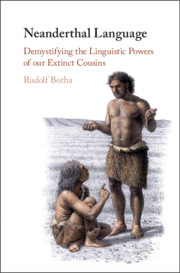Book contents
- Neanderthal Language
- Neanderthal Language
- Copyright page
- Contents
- Figures
- Images
- Acknowledgements
- Copyright Permission for Images
- Part I Preliminaries
- 1 Pursuing an Intriguing but Murky Matter
- 2 Telltale Neanderthal Teeth
- Part II Symbolic Behaviours
- Part III Non-symbolic Behaviours
- Part IV Implications
- Notes
- References
- Index
2 - Telltale Neanderthal Teeth
from Part I - Preliminaries
Published online by Cambridge University Press: 26 April 2020
- Neanderthal Language
- Neanderthal Language
- Copyright page
- Contents
- Figures
- Images
- Acknowledgements
- Copyright Permission for Images
- Part I Preliminaries
- 1 Pursuing an Intriguing but Murky Matter
- 2 Telltale Neanderthal Teeth
- Part II Symbolic Behaviours
- Part III Non-symbolic Behaviours
- Part IV Implications
- Notes
- References
- Index
Summary
Chapter 2 sets out the conceptual tools used in the book for analysing selected inferences about Neanderthal language. Derived from The Windows Approach to language evolution, these tools include conditions on the soundness of inferences drawn about something from data about another thing. Such inferences are not necessarily sound. The chapter illustrates three fundamental soundness conditions, using them in an appraisal of a composite inference about the linguistic capacity of European Neanderthals drawn from data about scratches in a number of their anterior teeth. These conditions are: (a) An inferential step must be grounded in factual data; (b) An inferential step must be underpinned by a warrant; and (c) A conclusion must be pertinent, referring to clearly identified and correctly characterised entities. Depicted by arrows, the four steps of the scratched-teeth inference are the following: There are scratches in a number of anterior Neanderthal teeth → Neanderthals ate with the right hand → They were right-handed → They had left-lateralised brains → They had linguistic capacity. The chapter finds the third inferential step to be contentious, and the fourth to be unsound.
- Type
- Chapter
- Information
- Neanderthal LanguageDemystifying the Linguistic Powers of our Extinct Cousins, pp. 11 - 28Publisher: Cambridge University PressPrint publication year: 2020

